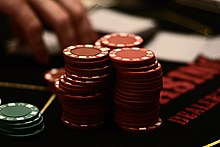Gambling
Gambling is a contest where a player bets on the result of an event. The bet is generally in the form of money. The rules and the amount of money bet have to be decided on before the event happens.



History
changePlaying cards appeared in the 9th century AD in China. Records trace gambling in Japan back at least as far as the 14th century.
Poker, the most popular U.S. card game associated with gambling, derives from the Persian game As-Nas, dating back to the 17th century.[1]
The first known casino, the Ridotto, started operating in 1638 in Venice, Italy.[2]
Types
changeThere are three variables common to all gambling.
- The amount of the bet.
- The predictability, or probability, of something that would happen in the event.
- The odds agreed upon by the players.
There are many types of gambling. Casino games, sports betting (especially horse racing), and state lotteries are some of the most common forms of gambling. Investments, such as stocks, bonds and real estate, are also sometimes considered forms of gambling. Generally, the odds are not in favor of the gambler.
Issues
changeMany people gamble for fun and entertainment. For others it becomes an addiction and a financial burden.[3]
Gambling addiction is a serious mental health issue which can become life-threatening. People with a gambling problem should seek help. Many organizations are trying to combat gambling addiction. One promising project to combat gambling addiction is the Global Self-Exclusion Initiative. This helps players get off gambling.[4]
Rules
changeGambling regulation differs in different countries. Some have established specific legal institutions. However, some countries have only overseeing laws. A well-known executive institution is The Gambling Commission in the UK. Its main function is controlling commercial gambling in partnership with people in charge of licensing. An example of strict ruling is the Gambling Law in the USA. The law decides gaming rules for local, state, and federal businesses.[5] In the United States, gambling is restricted almost everywhere, except in Las Vegas and in Atlantic City, New Jersey. New Jersey, legalised online gambling and poker in November 2013. In 2018, Swiss citizens voted that gambling should also be allowed on the Internet in the future. A convincing 73% voted in the referendum, in which 1.8 million Swiss people took part. The new Gaming Act was put into effect by the Federal Gaming Board on January 1, 2019. Since then, it has been completely legal for Swiss citizens to play games of chance on the Internet.[6]
In some places, such as mainland China, gambling is illegal. Chinese people cannot do so inside their country, so they go outside of it, such as to Macau, which is known as the "gambling capital of the world" because of its many big casinos. Other countries and local governments, such as Hong Kong, have some kind of gambling control board to make sure people don't gamble too much while allowing them to gamble.
Gambling has been banned in Brazil since 1946.
In Denmark, the Danish Gambling Authority, part of the Ministry of Taxation, makes sure gambling is fair and safe. They give out licenses for online and land-based casinos, like betting shops or online gambling sites. To get a license, companies must follow strict rules, like not having a criminal record and being financially stable. There are only a few licenses for physical casinos, but more are available for online gambling. Gambling ads must be honest and not target kids, and there are special rules to help people who gamble too much, including a way for them to exclude themselves from gambling sites. People in Denmark can gamble from age 18.
References
change- ↑ Wilkins, Sally (2002). Sports and Games of Medieval Cultures. Greenwood. ISBN 978-0-313-36079-4.
- ↑ Thomassen, Bjørn (2014). Liminality and the Modern: Living Through the In-Between. Ashgate Publishing, Ltd. p. 160. ISBN 978-1-4094-6080-0.
- ↑ "The Effects of Gambling". ProblemGambling.ca. 4 April 2016. Archived from the original on 21 February 2017. Retrieved 12 November 2016.
- ↑ "Interview with Safe Gambling Specialist Simon Vincze". casinoandslots.org. Retrieved 2022-11-04.
- ↑ "Gambling Commission". Archived from the original on 2019-06-24. Retrieved 2019-06-24.
- ↑ "Totodana". Archived from the original on 2023-02-10. Retrieved 2023-02-11.
Other websites
change- Gambling legislation and regulations. Archived 2016-12-07 at the Wayback Machine.